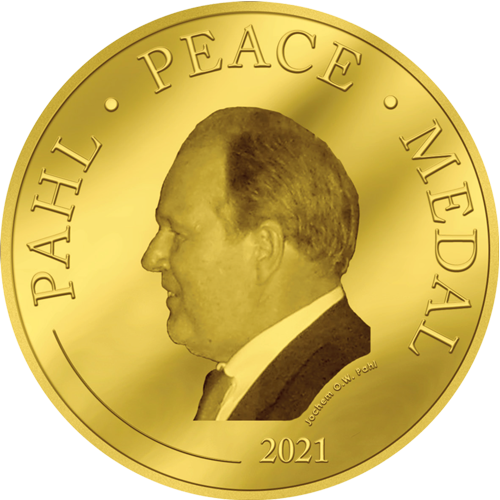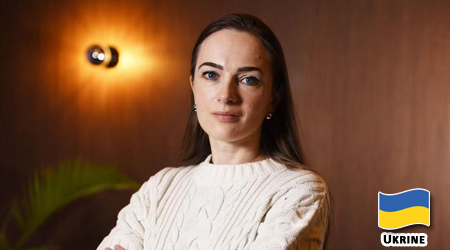Pahl Peace Prize

Pahl Peace Prize
The Pahl Peace Prize Foundation was founded in 2018 in the Principality of Liechtenstein. The purpose of the Pahl Peace Prize Foundation is the granting of an annual peace prize, consisting of a gold medal and a cash prize of up to EUR 100’000. This prize will be awarded to outstanding individuals who have considerably and actively contributed to world peace. The prize will be granted for the first time in the year 2021 in the Principality of Liechtenstein.
| Sl | Name | Country | Flag | Year | Awarded For |
|---|---|---|---|---|---|
| 4 | Oleksandra Matviichuk | Ukrine | 2024 | for her commitment to fighting injustice and documenting war crimes at enormous personal risk. Her fearless work in the face of the occupation of Crimea, the atrocities in Donbas and her initiative for the tribunal exemplify her passionate fight for freedom and humanity. | |
| 3 | Izzeldin Abuelaish | Palestine | 2023 | Dr. Izzeldin Abuelaish ist ein kanadisch-palästinensischer Arzt, der sich aktiv für die iIzzeldin Abuelaish is a Canadian-Palestinian doctor who is actively involved in Israeli-Palestinian reconciliation, particularly in the Gaza Strip. The Pahl Peace Prize 2023 honours Izzeldin Abuelaish for his commitment to peace, reconciliation and human dignity in the Middle East. | |
| 2 | Liselotte Latrous | Switzerland | 2022 | The Pahl Peace Prize 2022 honors Mrs. Lotti Latrous for her lifetime of service. Mrs. Latrous has always held the dignity of the poorest in the highest regard, has nursed them, and shone a light even in the darkest of places. | |
| 1 | Benjamin Ferencz | United States | 2021 | The American legal expert Benjamin Ferencz is the last living main prosecutor of the Nuremberg Trials and he fought throughout his life against war, for peace and for justice. |

Pahl Peace Prize Laureates (2025 ~ 2021)

Izzeldin Abuelaish
Pahl Peace Prize 2023
Dr. Izzeldin Abuelaish ist ein kanadisch-palästinensischer Arzt, der sich aktiv für die iIzzeldin Abuelaish is a Canadian-Palestinian doctor who is actively involved in Israeli-Palestinian reconciliation, particularly in the Gaza Strip. The Pahl Peace Prize 2023 honours Izzeldin Abuelaish for his commitment to peace, reconciliation and human dignity in the Middle East.Dr Izzeldin Abuelaish is a Palestinian-Canadian doctor and peace activist who has made it his life’s work to work against hatred and for peace and reconciliation between Israelis and Palestinians.Izzeldin Abuelaish was born in 1955 in the Jabalia refugee camp in the Gaza Strip and grew up in these difficult conditions. He also visited the schools in the refugee camp. Education was considered very important in the Abuelaish household. From an early age, it was his great wish to become a doctor. For his hard work, he was rewarded with a scholarship to study medicine at Cairo University. He then obtained a diploma in obstetrics and gynaecology from the University of London and a Masters in Public Health from Harvard University.Dr Abuelaish completed his residency at Soroka University Hospital in Beer Sheva, Israel, from 1997 to 2002. He was the first Palestinian doctor to practise medicine in an Israeli hospital. His mission was to help Israeli women with fertility problems. His role as a doctor is profoundly formative for his view of the world and his work. He sees doctors as natural peacemakers because of the morals of the profession.A severe personal setback occurred for Izzeldin Abuelaish on 16 January 2009. Four months after his wife died of cancer, three of his eight children – Beesan, Mayar and Aya – and his niece Noor were killed by Israeli tank shells during the Gaza war in an attack on his home. His heartbreaking reaction to the violent deaths of his three daughters was broadcast live on Israeli television and sparked worldwide reactions.This tragic personal loss, however, has only reinforced Dr Abuelaish’s doctrine that hatred is no answer to war. Rather, open communication, understanding, hope and compassion should be the means of choice to bridge the gap between Israeli and Palestinian interests. This is impressively presented in his autobiographical and award-winning book I Shall Not Hate: A Gaza Doctor’s Journey, which remarkably describes his commitment to forgiveness as a means to resolve conflict and a catalyst for peace.

Liselotte Latrous
Pahl Peace Prize 2022
The Pahl Peace Prize 2022 honors Mrs. Lotti Latrous for her lifetime of service. Mrs. Latrous has always held the dignity of the poorest in the highest regard, has nursed them, and shone a light even in the darkest of places.Mrs. Liselotte “Lotti” Latrous is a Swiss development worker and has been working for over twenty years in the Ivory Coast to fight the greatest human suffering of the poorest. Selflessness, compassion and helpfulness characterize Mrs. Latrous’ life.
Mrs. Lotti Latrous was born in 1953 in Dielsdorf, Switzerland, and grew up with two siblings in Regensberg. Even as a young girl, she felt a responsibility toward her neighbors. Her willingness to help has been expressed in various ways in her village, as helping gave her great joy even then.
At the age of sixteen, she went to Geneva as an au pair to learn French and it was there she met the love of her life, Aziz Latrous. When he began a career abroad, through his work at Nestlé, her life changed dramatically. The young couple moved every few years for the company, specifically in Saudi Arabia, Nigeria and Egypt. During these years their family grew and their three children, Selim, Sonia and Sarah, were born between 1979 and 1989. Eventually, the family relocated to Abidjan in the Ivory Coast.Two years after moving to Abidjan, Mrs. Lotti Latrous began caring for AIDS patients at the Mother Teresa Hospital. A doctor, who provided medical care to people directly in the slums of the city, soon took Mrs. Lotti Latrous with him on his rounds. This brought her face to face with the misery and suffering of the people there. She felt a great urge to help, and so Mrs. Lotti Latrous put her heart and soul into advocating for HIV infected people as well as the dying, and to care for them with dignity. In Adjouffou, one of Abidjan’s slums, Mrs. Latrous opened the Centre L’Espoir (Center of Hope) in 1999, a center for outpatient treatment. It was later followed by a hospice for the dying and a children’s home for AIDS orphans.When her husband was transferred back to Egypt after a short time, the mother of three decided to stay in Abidjan to continue caring for the needy and sick people in the slums. Her willingness to help went so far that she lived apart from her family for months. The family overcame this great challenge and also recognized the importance of Mrs. Lotti Latrous’ commitment. Further her work had an impact on Mrs. Latrous’ health. In 2013, the after-effects of a severe case of tuberculosis meant that Mrs. Lotti Latrous had to return to Switzerland for ten months to recover and recuperate.The outpatient clinic, hospice for the dying, and children’s home were moved to Grand-Bassam, Ivory Coast, in 2017. To this day, the Centre L’Espoir gives hope to the poorest. Countless people who were affected by malaria, tuberculosis and many other diseases besides AIDS have already had their lives saved.One of the latest projects included the construction of a village for chronically ill and partially homeless seniors. This village is intended to bring people together from different generations. Younger people take care of the elderly and gain a profession, and the seniors are happy when they receive visits by the children of the children’s home.
View More

Benjamin Ferencz
Pahl Peace Prize 2021
The American legal expert Benjamin Ferencz is the last living main prosecutor of the Nuremberg Trials and he fought throughout his life against war, for peace and for justice.In 1920, as the son of Jewish parents, Benjamin Ferencz was born in Hungarian Transylvania. His family emigrated to Brooklyn, USA, when he was ten months old and lived in impoverished conditions. Benjamin Ferencz attended the Townsend Harris High School for gifted boys, studied at the City College of New York and graduated from Harvard Law School in 1943. In 1944, Ferencz came to Europe as a common soldier and was confronted with National Socialist crimes in Germany. In his capacity as a soldier he collected evidence of the crimes committed by the National Socialists.At the age of 27, Ferencz represented the prosecution against the members of the SS task force who had killed hundreds of Jews, Sinti and Roma. In September 1947, he made his first plea in Nuremberg, stating, “This was the tragic result of a program of intolerance and arrogance. Retribution is not our objective.” Benjamin Ferencz emphasizes that conviction to this day, more than 70 years after his plea in the world’s biggest murder trial of all time, “Because retribution does not bring peace.”



